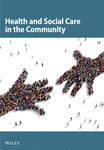Activities of daily living, cognitive impairment and other psychological symptoms among elderly recipients of home help
Abstract
Previous studies have shown a relationship between physical functioning and having home help. The hypothesis behind this study, carried out on a random community sample of 168 subjects aged 75 years and above, was that having home help would also be associated with cognitive impairment and psychological symptoms. Bivariate analysis showed that cognitive impairment was significantly more frequent among home help clients, whereas indicators of anxiety and depression were not. After multivariate adjustment, living alone, poor perceived health, problems in performing primary activities of daily living (ADL), instrumental ADL and, in particular, experiencing difficulties in cleaning the house remained the only variables independently related to having home help. Of these, difficulties with cleaning the house was the most powerful predictor. The home help seems to be used mainly to compensate for impaired mobility. An association between cognitive functioning and the provision of home help is related to a limitation in the ability to perform ADL associated with cognitive impairment.




